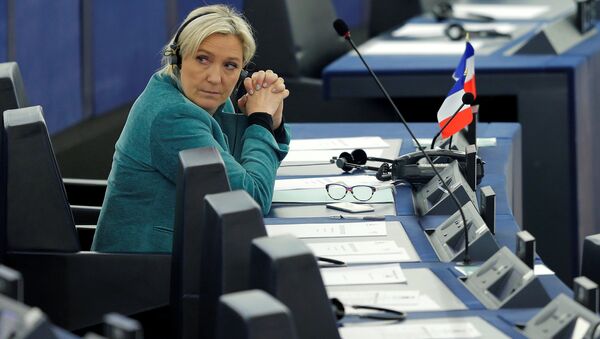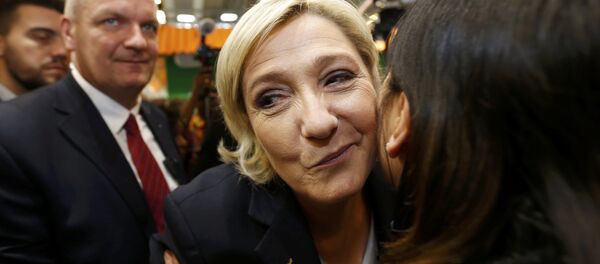On Thursday, the European Parliament stripped National Front leader and MEP Marine Le Pen of her parliamentary immunity after a request from French prosecutors. Public prosecutors in Nanterre want to press charges against her for "publishing violent images." The charges carry a maximum fine of 75,000 euros ($79,000) and a three-year prison sentence.
Le Pen shared gruesome photos of Daesh (ISIL/ISIS) murders with her Twitter followers in December 2015 because she was incensed by a comparison made between National Front and the terrorist group by French journalist Jean-Jacques Bourdin on French television and the radio stations BFMTV and RMC.
"Daesh is THIS!" Le Pen tweeted, alongside graphic photos of Daesh executions she used to illustrate her point. The three photos showed the decapitated body of journalist James Foley and two other prisoners, one set on fire in a cage and another victim being driven over by a tank.
Le Pen later deleted the photos after a complaint from Foley's parents, but defended her actions, saying she didn't know who the victims were and that the photos were readily available on the internet.
She was roundly criticized by political opponents for tweeting the photos. Prime Minister Manuel Valls called the post "incendiary to public debate," and Interior Minister Bernard Cazeneuve reported the offense to police.
Le Pen is also accused of misusing European funds, and the EU has demanded she return €339,000 ($357,000) she was paid for the fictitious employment of two staff members. According to the EU's anti-fraud office OLAF, in reality the pair did work for the National Front, not the EU. OLAF has launched a procedure with the EU to reclaim the money from Le Pen's wages, while the politician continues to deny the charge.
Dr. David Lees, a researcher on French politics at Warwick University (UK) told Radio Sputnik that the European Parliament's decision to lift her parliamentary immunity should be seen in the context of the financial allegations.
"The alleged financial misconduct is something the EU would perhaps be keener to investigate than these images and that is more likely to have an impact in terms of Le Pen's popularity, because if it comes down to it, Le Pen seeming to steal or at least misuse European money is a positive thing for her. It appeals to people who are already disillusioned with the European Union in France as a whole," Lees explained.
"To be perceived as a vendetta by the European Union, which arguably it could be, is not necessarily a bad thing at all."
"Le Pen is a notable thorn in the side of the European Union. She is very keen on allowing France to leave, (although) of course this would only depend on her being elected President and then having the powers to be able to enforce a referendum on French membership."
Fellow presidential candidate Francois Fillon of Les Republicains is also facing allegations of financial impropriety, as well as calls to step down as the party's candidate.
French prosecutors are investigating claims he invented a fictitious job for his wife as a parliamentary assistant. According to the newspaper Le Canard Enchaine, Penelope Fillon was paid €831,400 ($875,000) over several years for the work, but she didn't have a parliamentary pass.
"The Le Pen situation does very little to dent her popularity in France and if anything will probably increase it. With the Francois Fillon situation, his failure to resign yesterday afternoon has really dented his ambitions of becoming a serious candidate for the presidency. If anything, I think yesterday's decision with regards to the EU is something which just increases the opportunity of a President Le Pen come April and May of this year," Lees said.




